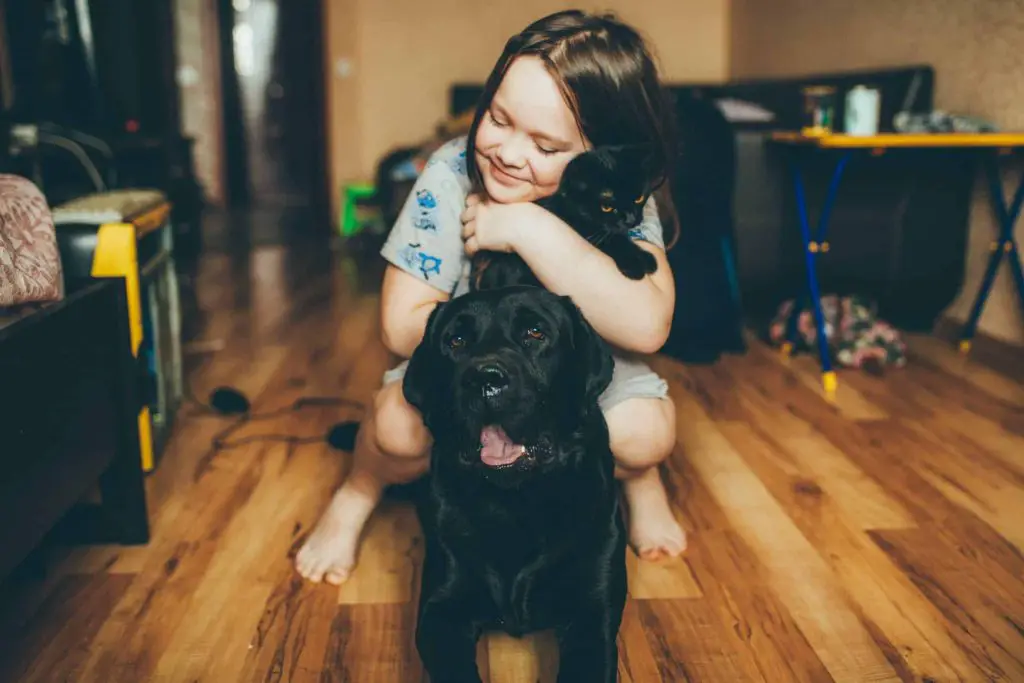Dog lovers will agree that the benefits of owning a dog are numerous! It’s an important decision whether or not to add a canine companion to your life. Research has shown that dogs contribute to their human’s life with better health and wellness.
This comprehensive article, The Benefits of Owning a Dog, will look at specific health and wellness benefits of owning a canine. Dog ownership comes in many forms, for many people it’s caring for an animal that provides companionship.
Dogs contribute to our health in ways we never thought possible! The benefits of owning a dog is evident in the improved physical and mental health of humans.
Dr. Alana Wenban DVM, is a practicing small animal veterinarian. When asked the benefits of owning a dog her reply was “dogs help people lower their blood pressure, they get people moving, teach kids responsibility, and give a person a reason to get up in the morning, even when they don’t think they are able.”
The health benefits of owning a working dog can be life changing. It’s worth the time to look at the commitment of these remarkable dogs. Benefits of owning a dog can be in the form of training your dog to bring comfort to others, such as a therapy dog.
Dogs contribute to better physical health and psychological health. People experience the benefits of owning a dog in unique ways.
Related Posts:
- A Review of the 5 Best Slow Feed Dog Bowls
- A Review of the 5 Best Retractable Dog Leashes
- A Review of the 5 Best High Fiber Dog Foods For Anal Gland Problems
- The 5 Pawsitively Best Dog Nail Grinders

Kids can learn valuable life lessons, have improved immunity and better social development. The benefits of owning a dog in those early development years is fascinating.
Humans benefit from owning a dog by spending time with a dog. The dog to human connection is fulfilling. We can learn more about connecting with our dog by learning their language, training with them, and even through touch.
In The Benefits of Owning a Dog, we’ll look at learning the best way to add a dog into your life. However, it is best to make good choices based on your lifestyle and activity level. Dogs come with predisposed genetic traits, individual temperaments, and personalities.
The relationship and bond between dogs and humans add to our quality of life.
Relevant Articles:
- A Review of the Top 5 Best Brooms For Dog Hair
- A Review of the 5 Best Peanut Butters for Dogs
- A Review of the 4 Best Dog Shampoos for Itchy Skin
- A Review of the 5 Best Dog Brushes For Short Hair
- A Review of the 6 Best Dog Harnesses for Hiking
Improve Your Health – Get a Dog
The benefits of owning a dog are evident in our interactions with others and even how we handle time by ourselves.
Dogs are more than just furry pets that we feed every day, take on walks and cuddle beside us at the end of the day. One of the benefits of owning a dog is companionship.

Dogs provide us with many health benefits. Here are the top ten reasons people experience the benefits of owning a dog:
Canine Companionship: Top Ten Benefits of Owning a Dog
- Unconditional love
- Reduces feelings of loneliness (1)
- Alleviates feelings of stress and anxiety
- Encourages us to be active
- Natural mood boosters
- Prompts us to be mindful
- Teaches responsibility
- Help people meet and form new friendships
- Gives people a sense of purpose
- Brings people comfort
When we think of companionship with animals our first thought might be a dog that lives everyday with us. The meaning could possibly be more than just living with us.
Oxford Dictionary defines companion as “a person or animal with whom one spends a lot of time or with whom one travels.” (2) Dictionary.com defines companion as “a person (or animal) employed to accompany, assist, or live with another in the capacity of a helpful friend. (3)
Humans seek out the companionship of dogs when they are lonely, sick, upset, grieving, tired, and have feelings of despair. How do dogs know that something is different with their humans? Dogs have an incredible sense of smell and intuition.
The benefits of owning a dog include when we are not feeling well. When we are sick or injured, dogs can smell the difference in our body chemistry. Dogs have been known to comfort the sick, guard the injured and run for help when assistance is needed.

In 2018, National Geographic reported on an experiment that was conducted to better learn how dogs recognize human emotions. The various trials concluded that dogs are more intuitive than we originally had thought. (4)
Another reason for the human and canine bond is friendship. It could come in the form of a listening ear, unending loyalty or working alongside them every day in the form of a specific service to the person.
Our canine companions demonstrate a practice that we could adopt as humans, mindfulness.
Relevant Articles:
- A Review Of The Top 5 Best Carpet Cleaner Solutions for Dog Urine
- A Review Of The Top Best Silent Dog Whistles
- A Review Of the Top 5 Best Artificial Grasses For Dog Potty
- A Review of the Top 5 Best Dog Carrier Backpacks
- A Review of the 5 Best Dog Frisbees
Benefits of Owning a Dog: Better Mindfulness
One of the above-mentioned reasons for the benefits of owning a dog is it “prompts us to be mindful.” When we take our dog for a walk, we can notice they focus on the present and view each new smell as an adventure.
Mindfulness is the ability to live each moment in life as it is presented. A study done by Harvard Medical School suggests that when we practice mindfulness with our dog, we better appreciate simple everyday experiences. (5)
Dogs exude joy when they are on a sniffy walk or relaxing by your side. They are content with what is happening now. Our dogs help us live in the moment and find ways to appreciate our current reality.

We can be motivated by our dogs to take in the sights, smells, and sounds around us. Dogs naturally take advantage of the opportunity in the outdoors to discover new scents, walk on different textures and take note of other living creatures.
As humans we can certainly learn mindfulness from our canine companions, just one of the benefits of owning a dog.
It is no surprise that dogs can be incredibly smart. Many dogs desire nothing more than to learn a skill and practice it the rest of their lives. This unique dog lives each day to be a working dog.
People Benefit from Working Dogs
Working dogs are more than just companions to their humans, they have a specific job that requires focus and intense training. The breed of dog is carefully chosen to match the dog’s natural instincts with the job they are being trained to perform.
Physical jobs that are unique to certain dog breeds can include pulling sleds, pulling milk carts, herding livestock, protecting the farm, guarding the family home, and even sniffing out fire and danger. A working dog can have a fulfilling life that indeed benefits the owners.
People with disabilities experience firsthand the benefits of owning a dog. Their trained service dog allows them to participate in everyday activities.

The Americans with Disabilities Act (ADA) defines service animals as “a dog that has been individually trained to do work or perform tasks for an individual with a disability. The task(s) performed by the dog must be directly related to the person’s disability.” (6)
According to the ADA, disabilities can be “physical, sensory, psychiatric, intellectual, or other mental disability.” (6)
A working dog might also be referred to as a service dog when paired with a person with disability.
Relevant Articles:
- How to Stop a Dog from Pooping in the House at Night
- How to Potty Train an Older Dog in an Apartment
- How to Grind Your Dog’s Nails
- How to Get a Dog To Take a Pill
- Learn The Secrets Of How to Clip a Dog’s Nails Safely!
Benefits of Owning a Dog: Roles of Service Dogs
The AKC defines a working dog “as a purpose-trained canine that learns and performs tasks to assist its human companions. Detection, herding, hunting, search and rescue, police, and military dogs are all examples of working dogs.” (7)
What makes a service dog stand out is the process of taking a puppy and training it for a specific task. Training is both time consuming and expensive.
Training a service dog for a specific task takes between 18 months and two years. In addition to the time invested by trainers, it costs a minimum of $25,000 for a fully trained service dog. (8)
Guide Dogs: These dogs are trained specifically to assist people with visual impairment or hearing impairment to navigate their everyday life. Some remarkable guide dogs can assist people with both impairments.
Medical Assistance Dogs: Specially trained dogs detect specific medical conditions in people to control or prevent a severe medical emergency. These dogs can be trained to detect the onset of a seizures, panic attacks, diabetic emergencies, life threatening food allergies and cardiac emergencies.
Mobility Assistance Dogs: Dogs that have been trained to assist people in wheelchairs, provides assistance to a person who has difficulty with standing or gaining balance, they open doors, and retrieve objects.
Dogs for Soldiers: Service dogs that are trained to assist a soldier with post trauma mental health issues or even mobility issues.

Lori Shaw is the founder and trainer for Helping Paws for Veterans. In her program she trains the veteran and dog to work together. “When paired with a service dog, 82% of veterans with PTSD had decreased symptoms, and some were able to take fewer or completely stop taking medications.” (9)
Dogs support and save the lives of veterans by “reducing stress, helping with balance issues, waking them up from nightmares, motivating them to exercise, giving a heightened sense of safety and best of all, less war thoughts and more in the moment thinking.” (9)
Disease & Drug Detectors: These dogs are trained in scent work to specifically smell for disease in humans, such as cancer. Drug dogs have the ability to distinguish between different types of drugs and to detect when they are present.
The benefits of owning a dog that is specifically trained to serve a human can indeed be life changing.

Benefits of Owning a Dog: Dog Heroes
Working dogs that have contributed to saving human lives become real-life dog heroes. They come with search and rescue experience, trauma response training and dogs specifically trained in tracking scent.
One traumatic event in our nation’s history happened on September 11, 2001, when the twin towers in New York City were attacked, now called Ground Zero.
Our country has a new awareness for search and rescue dogs that proved dogs have courage and tireless work ethic that benefits mankind. Dogs (and their handlers) that were trained for national disasters made history that day.
Apollo, a German Shepherd trained in search and rescue, was the first dog to arrive at the collapse of the towers. He risked his life and was almost killed by flames and falling debris.
Coby and Guiness are both Labrador Retrievers that were trained in scent-work to find cadavers. They worked long hours for eleven days doing their job without complaint.
Roselle, a Labrador Retriever trained as a guide dog for the visually impaired, brought her handler and several others to safety after the buildings were on fire.
Riley, a golden retriever trained as a search and rescue dog, played a remarkable role in the “9-11 tragedy”. He’s known for going beyond what he was trained to do and bringing comfort to those around him. (10)
Over 300 dog and handler teams responded that day to Ground Zero and dedicated their expertise to finding people, guiding people, and one unexpected role was comforting the rescuers and people being rescued. (11)
The benefits of owning a dog that becomes a hero from serving mankind is worthy of noting.
It was after this national tragedy that more people began to train their dogs to serve together as trained search and rescue teams and therapy dog teams.
Relevant Articles:
- How to Obedience Train Your Dog
- How to Leash Train Your Dog
- How to Get Rid of Dog Warts at Home
- How to Housebreak or Potty Train Your Puppy
- How to Clicker Train Your Dog
The Benefits of Owning a Dog: Psychiatric Service Dogs
A psychiatric service dog benefits its owner in both mental and physical ways. These amazing dogs are chosen for their calm and friendly temperament as well as intelligence.
Psychiatric service dogs must be able to learn new skills quickly and perform tasks that require alertness and speed.
The dog is trained to perform specific tasks such as interfering with negative behavior related to an obsessive-compulsive disorder. They need to be always aware of their handler’s emotional state. (12)

The benefits of owning a dog for a person with psychiatric issues is a matter of physical and mental safety.
Physical tasks of a psychiatric service dog include deep pressure therapy, tactile stimulation, or evaluate the environmental conditions. (12) The tasks of psychiatric service dogs are diverse and could include bringing their handler the right medication at the right moment.
Dog’s Contribute to Better Health – Psychological
As we continue to learn more about the health benefits of owning a dog, we can have a greater appreciation for our canine companions. Reducing stress in our life is one benefit we can thank our dogs for every day.
According to the American Institute of Stress “77% of people have stress that affects their physical health.” (13)
The good news for dog owners is that research has shown that dog owners have reduced stress loads from having a dog in their life.
The Benefits of Owning a Dog: Reduces Stress
Life can be busy, stressful, and even hard to handle some days. Businesses and private companies have noticed that by allowing dogs in the workplace, they are seeing employees handle everyday stress better.
The International Journal of Workplace Health Management conducted a study on the health benefits of a dog’s presence in a work setting. It was discovered that people who brought their dog to work had reduced stress levels. (14)
Many universities and community colleges ask therapy dog teams to visit their campus during exam week. They found it reduces anxiety in the midst of exam week for their students. The students come to interact with the trained therapy dogs; petting them, talking to them, and even just sitting quietly to pet a peaceful dog.

Studies have shown that the benefits of owning a dog include lowering blood pressure that is contributed to stressful situations.
“One study even found that when people with borderline hypertension adopted dogs from a shelter, their blood pressure declined significantly within five months.” (15)
Research has shown that by simply petting a dog lowers the stress hormone, cortisol. At the same time, it increases the levels of the feel-good hormone, oxytocin. (16)
People that desire to share the benefits of owning a dog, that has a calm, friendly temperament, is they learn together how to participate as a therapy dog team.
Relevant Articles:
- How to Train a Dog to Run Next to a Bicycle
- How to Teach an Older Dog New Tricks
- How to Train a Deaf Dog
- The Top 12 Fun and Easy Dog Tricks
- How to Train a Dog
The Benefits of Owning a Dog: Therapy Dogs
Therapy dogs are trained to work with their handler, who is usually the owner. They are referred to as a team that brings comfort to people with either a physical or emotional issue. These dogs offer a listening ear and bring comfort to people that are lonely or grieving.
Therapy dogs and their owners visit people in hospitals, adult care homes, nursing homes, libraries, and schools. These dogs are friendly and have been trained to be calm and comfortable in a variety of settings.
Libraries open their doors to allow therapy dogs and their handlers to come for a specific reading time with kids. The kids are given the opportunity to read to the dog or they can listen while the handler reads to them.

“Kids who read to real animals showed better social skills and more sharing, cooperation, and volunteering. They also have fewer behavior problems.” (17)
The intensity and length of training required for a service dog is quite different then a therapy dog certification. Therapy dogs work as a team with their handler to bring comfort to others.
What makes a dog a therapy dog? Dogs must have reached adulthood to become a therapy dog. Many programs require a temperance test to see if the dog is a good fit for greeting and working around people of all ages, gender, size, and energy levels.
The next step is for the handler and dog to practice obedience skills that would allow them to achieve a Canine Good Citizen certification. Dogs must be able to walk nicely through a crowd of people, greet people with all paws on the floor, sit quietly in the presence of other dogs and leave an object on command.
Training yourself and your dog to work as a therapy dog team is truly one of the rewarding benefits of owning a dog.
The Benefits of Owning a Dog: Emotional Support Dogs
People that have been diagnosed with psychological or emotional disorders might consider owning an emotional support dog. These dogs are not service dogs or therapy dogs.
Emotional support dogs are considered companion animals that ease anxiety, depression, loneliness, and some phobias for people with psychological disorders.
Mental health professionals saw the benefits of owning a dog for their patients and began prescribing emotional support dogs. Doctors have seen patients who struggle with an anxiety disorder, major depression and panic attacks find some relief from these dogs.
Emotional support dogs do not have special training to fulfill a specific job. The dog’s whole focus is being comfortable with their human.

Characteristics of a good emotional support or companion dog would include calm demeanor, good manners, confidence, obedient, social, and loves human contact.
One of the most important traits of an emotional support dog is to have a strong connection with their owner. Support Dog Certification states, “the stronger the bond is, the better the dog can sense the changes in the emotional state of their handler.” (18)
Relevant Articles:
Dog’s Contribute to Better Health – Physically
The benefits of owning a dog include improving our physical health. Dogs naturally encourage people to be active. All dogs need to eliminate several times a day and all dogs need exercise.
When people walk their dogs, it builds muscles, relieves stress, has cardiovascular benefits, and curbs loneliness. Dogs can be great motivators for people in physical therapy settings or people recovering from injuries.
One therapeutic program that uses dogs to physically benefit people is animal assisted therapy.
The Benefits of Owning a Dog: Animal Assisted Therapy
During the 1960’s the first research began involving animal assisted therapy. Although it wasn’t a new idea even then to use animals to aid people with physical and mental illness.
In the 1940’s the American Red Cross worked together with the Air Corps to establish farms where soldiers could go to recuperate. The soldiers would care for and interact with the animals on the farm while they were healing from war injuries and illness.

“A small pet animal is often an excellent companion for the sick” Florence Nightingale in 1859. (19)
Animal Assisted Therapy (ATT) Defined: “ATT is the utilization of animals as a therapeutic modality to facilitate healing and rehabilitation of patients with acute or chronic diseases.” (20)
ATT is considered non-traditional therapy, as it reaches people who find it difficult to engage in traditional therapies. The patient does not have to own a dog to participate in the program.
The ATT program uses the dog as the treatment tool to help the patients reach their goals. One type of treatment could be feeding, bathing, and grooming a dog on a regular basis.
To better understand this program and how dogs are beneficial, we will look at three specific examples of Animal Assisted Therapy:
- A volunteer brings her trained dog to the rehabilitation center where an occupational therapist works with a child. The child works on their fine motor skills by manipulating buckles on harnesses, clasps on leashes, collars, and animal carriers. The child opens and closes treat containers to offer the dog small pieces of food. (21)
- A patient is in rehabilitation to work on walking on their own without assistance. A therapist and their patient walk a trained dog on a double leash around the facility.
- Someone whose goal is increasing hand mobility might pet a dog at each session or even hold a brush and groom the dog.

Health & Wellness Benefits of Owning a Dog
We know that dogs play a powerful role in the life of their owners. People that have a dog in their life can benefit from more than just companionship.
Researchers have found health benefits of owning a dog include better heart health, eases loneliness, and improved fitness.
Improved Cardiovascular Health. Dr. Suzanne Steinbaum from The American Heart Association lists the human health benefits of adopting and owning a dog.
“Adopting a dog is good for heart health and increasing lifespan. Dogs help you stay active with daily walks that can decrease your blood pressure. Taking care of a dog can reduce stress and depression is both good for your heart.” (22)
Sarah Rigby from Science Focus reported on a study that found “having a dog can help improve cardiovascular outcomes, especially for heart attack and stroke survivors living alone.” (23)
“Scientists at the American Heart Association say that, compared to those without a pet dog, owners experienced a 24 per cent reduced risk of all-cause mortality and are 65 per cent less likely to die after a heart attack.” (23)
We can add improved cardiovascular health to the benefits of owning a dog. “Pet owners have lower triglyceride and cholesterol levels (indicators of heart disease) than those without pets.”(15)
Eases Loneliness. People can feel lonely for many reasons such as health issues, work schedule, raising young children, caring for older parents, or lost connectedness to society. Easing loneliness is one of the benefits of owning a dog.
Dr. Jeremy Barron, the medical director of the Beacham Center for Geriatric Medicine at Johns Hopkins states that “caring for a pet provides a sense of purpose to the owner.” (23)

Dogs can increase feelings of social support and give a positive mood boost. People feel less lonely and more connected to others.
Feelings of loneliness are reduced when people care of their dog. They know their dog is counting on them for food, water and to be let out for a walk every single day. Dogs also provide their owners with loyalty and a listening ear.
“Human Animal Bond Research Institute and Mars Petcare surveyed 2,000 people in the U.S. and reported 85 percent of those polled believed interaction with companion animals could help reduce loneliness in people.” (24)
Relevant Articles:
- Ultimate Guide: How To Take Care Of A Puppy
- Ultimate Guide: How To Take Care Of A Dog
- Ultimate Guide: How To Take Care Of A Senior Dog
- Top 12 Tips for First Time Dog Owners
Increased Fitness. Dogs of all sizes and ages need to get outdoors to stretch their legs, walk, play, and smell. In order to get outdoors, they count on their owners to join them.
Many people add a dog to their life for these benefits of owning a dog, getting outdoors, exercise companion, and improving their personal fitness levels. (25)
Rain or shine a dog needs to get outdoors to eliminate and exercise. People are willing to do that for their loyal canine companion.
The difference between non-dog owners and dog owners is, they have a sense of responsibility and necessity to take their dog outdoors. Dog owners give their dogs the exercise they need every day regardless of the weather and how they feel that day.

Fitness Study Based on Dog Owners versus Non-Dog Owners.
The American Heart Association conducted a study that involved more than 5200 adults. Those people with dogs engaged in more physical activity than non-dog owners, making them 54% more likely to meet recommended levels of physical activity. (26)
In addition to caring for their dogs, owners also played with their dogs, hiked with them, and took them for walks and bike rides.
The BMC Public Health Journal reported on a study of the physical activity of dog ownership. The results were “dog owners on average walked 22 minutes more per day compared to people who didn’t own a dog.” (27)
Most dog owners walked at a moderate pace, meeting the fitness requirements recommended by the Center for Disease Control and Prevention.
Dog owners benefit physically from getting out and being active with their dogs. The benefits have no age limit. The benefits of owning a dog for children is outstanding.
Kids Benefit from Dog Ownership
Children can experience the benefits of owning a dog ranging from physical health benefits, social benefits, and numerous life lessons.

Responsibility is the first thing that comes to mind with kids and dogs. However, the benefits go beyond taking care of the basic needs of a pet.
Kids can practice gentle and kind behavior to living creatures. They experience first-hand that dogs make good listeners and are fun to teach new skills.
Related Articles:
- How to Cook Marrow Bones for Dogs
- A Review Of The Top Five Best Foods for Hiding Dog Pills In
- A Review of the Top 5 Best Dog Bones For Aggressive Chewers
- A Review Of The Top 5 Best Bone Broths for Dogs
- A Review Of The Top 5 Best Dog Whistles
Benefits of Owning a Dog: Life Lessons
The life lessons from owning a dog include teaching responsibility, trust, and respect. Animals are a great tool for teaching compassion and patience. Children learn to be kind to others by taking care of their dog. They learn the dog is unable to take care of itself and needs their care.
Children learn to respect animals, such as dogs. They need to be respectful and give their dog space to eat, drink and sleep. They learn to have a gentle touch and use positive words when praising good behavior.
Motivation is another life skill children can develop from owning a dog. “Because of all the skills pet ownership provides, young children have better grades at school due to developing internal motivation while caring for their animals.” (28)
One additional life lesson that is important is discipline. Kids learn to be disciplined by caring for their dog on a daily basis. Dogs should be feed around the same time each day, they need fresh water, time to eliminate outdoors, regular grooming, play time, and obedience skills.
The benefits of owning a dog are endless, however when it comes to life lessons kids can learn from owning a dog, that is truly priceless!
Benefits of Owning a Dog: Less Allergies and Sickness
Children that have exposure to dogs as infants tend to have less allergies and ear infections. Researchers suggest the reason behind less allergy related illness is that dogs stimulate the children’s immunity.

One study, “Why Dogs and Cats Make Babies Healthier” report that babies that grow up with a cat or dog in their home are less likely to get sick then children who grow up in pet-free homes. (29)
Researchers suggest one reason is that microbes and pet dander prime a babies developing immune system.
“We think the exposure to pets somehow matures the immune system so when the child meets the microbes, he might be better prepared for them,” says Dr. Eija Bergroth, a pediatrician at Kuopio University Hospital in Finland who led the current study. (29)
The outside microbes that come into your home on our pet’s paws and fur could contribute to less sickness in children. One of the health benefits of owning a dog when raising children.
Related Articles:
- The Best Canned Dog Food for Dogs with Sensitive Stomachs
- A Review Of The Top 5 Best Tactical Dog Harnesses
- How to Build an Outdoor Dog Potty Area on Concrete
- A Review of the 5 Best Dog Muzzles
- A Review Of The Top 5 Best Dog Clickers
Benefits of Owning a Dog: Social Development Benefits
Children, as young as two and three years old reap the benefits of owning a dog. Interacting with the family dog, play acting, and participating in the daily care of the dog all contributed to building healthier social skills.
Pediatric Research conducted an observational study on the relationship between dog ownership, dog play, family dog walking, and preschooler social and emotional development. The study found the children had lower peer problems and conduct problems. (30)

Kids that helped their parents walk the family dog at least once a week and played with the family dog at least three times a week saw greater results in social development. (30)
Pediatric Research found that teaching a child to care for and love a pet creates a healthy emotional connection and enhances our purpose to give to others. (31)
The benefits of owning a dog in a household with children is evident in three areas:
- Dogs help children think and problem solve through interactive gentle play.
- The involvement of children in the training of obedience skills and pet tricks teaches them how to practice clear and meaningful communication skills. (31)
- Children can benefit from the companionship of a dog and a relationship that requires giving of oneself.
Children can experience the benefits of owning dog in similar ways as an adult. A well-mannered dog can boost their mood, reduce cortisol levels (feelings of negative stress), provide a faithful friend, and increase feelings of social support. (32)
Parents often see adding a dog to the family as extra work and expense but to some children it’s the potential for a loving loyal family member.
Related Articles:
- How to Train a Deaf Dog to Stop Barking
- How to Train Your Dog with Positive Reinforcement
- How to Crate Train a Dog
- How to Train Your Dog to Walk on a Leash
- How to Train Your Dog to be Social

Dogs & the Human Connection
Most dog owners would agree that their four legged companion has enriched their life. There is a special component that is unique to the dog and human connection.
A few words that describe the benefits of owning a dog: Love. Loyalty. Affection. Faithful.
Dog owners are heard saying that no matter what is happening in their life, their dog is present through the smooth times and the tough times.
“As further proof of the unshakable human-dog bond, (Barkbox) study participants in relationships, admitted that they say “I love you” to their pups just as often as they profess their love to their partners. Most also confessed that they’re more tolerant of their dogs’ undesirable behaviors than those of their fellow humans.” (33)
Often humans will choose dogs that fit their personality. People that own Golden Retrievers tend to be out-going and have an active lifestyle. Lap dog owners find they enjoy affection and nurturing others.
It’s not surprising, that “the type of dog you choose might offer insight into your unique personality.” (33)
Related Articles:
- How to Properly Carry a Dog
- How to Treat a Dog Ear Infection at Home without a Vet
- How to Play with Your Dog
- Rules of How to Walk Your Dog
- A Review Of The Top 5 Best Salmon Oils for Dogs
The Benefits of Owning a Dog: Physical Contact with Canines
Humans find joy and pleasure from petting and touching a canine. The breed and size of the dog matter little to animal lovers.
Dr. Lyssa Alexander, DVM, states in her article Animals enhance our lives in many ways, but physical contact tops the list as being beneficial, “There is something truly special and powerful about that cross-species connection.” (34)
When humans make that physical contact with a dog, they are releasing oxytocin, which is our “feel good” hormones. Petting a dog can also reduce chronic pain from long-term disease or a chronic illness.
One study conducted in Japan, tested the effects of pet therapy on elderly inpatients. The study showed patients had better cognitive function, improved mood, and perceived quality of life simply by petting an animal. (35)
Related Articles:
- How to Cook Liver for Dogs
- How to Get a Picky Dog to Eat
- How to Stop Your Dog from Peeing When Excited
- How to Keep Your House from Smelling like Dog
- How to Measure a Dog for a Harness

Humans are attracted to dogs, especially puppies. They trigger an innate caregiver response. (36) People are drawn to “feel good” dog rescue and adoption stories. Dogs with floppy ears and big eyes are physically less threatening and soften human hearts.
In fact, sometimes people see an “adorable puppy” and are automatically drawn to it. A few people might self-proclaim they are dog whisperers and want to handle every dog that crosses their path, just to meet a felt need.
As a word of caution, before interacting with any animal, including a dog, always ask the owner and wait for the reply. Remember to respect the answer of the owner as well. Puppies might be learning to focus on their handler, or an adopted dog might be learning to how to safely navigate the world.
We just never know the circumstances of every dog we encounter. It’s important we teach children that even though we feel the “need” to touch the dog, the dog might not always feel the same way.
One way to win the heart of a dog is to respect its space and wait before showing human affection. Understanding canines is one way to make a true connection with them.
The Benefits of Owning a Dog: Better Connection with Dogs
When we truly make a connection with our dog, we can experience more benefits of owning a dog. The goal of connecting with our dogs is to have a healthy cross-species relationship.
Humans desire to feel connected to their dog to alleviate stress in new situations, to better train their dog, and possibly for medical reasons. We have two big hinderances when it comes to connecting with our dog; we are different species and speak a different language.
Connect Through Language. Learning canine body language will help us “read” our dog’s motions and actions better. Dogs communicate through their body posture, yawns, lips, ears, and other bodily movements.
A dog’s tail communicates they are friendly, aggressive, scared, and even thinking. Even how the dog holds its tail and moves it can tell us a lot about our dogs. The same is true for their mouth, when it’s closed tight versus open tells us a bit what they are thinking.
Related Articles:
- How to Get the Attention of a Deaf Dog
- How to Train a Deaf Dog to Sit and Stay
- How to Train a Deaf Dog with Hand Signals
- How to Potty Train a Deaf Dog
- Basic Dog Training Commands

Connect Through Training. One of the joys and benefits of owning a dog is spending time teaching the dog good manners. Local kennel clubs offer obedience training classes to the community for this reason.
A calm dog that interacts well with its family is the end goal for most dog owners. People like a dog that looks at them instead of the squirrel in the park. Training a dog to walk nicely on a leash is a bonding experience for both humans and dog.
One philosophy is to tap into the dog’s front-brain, the part of the brain that the dog uses to respond to learned behaviors. Brenda Aloff, a reputable animal behaviorist and author teaches her students the Get Connected protocol.
“The ultimate goal is a dog who thinks and responds, rather than one who just reacts instinctively or fearfully. The Get Connected protocol is wonderful for teaching a dog to think and then do.” (37)
Connecting to our dog through specific training protocols is a rewarding experience.
Connect Through Massage. Another meaningful way to spend time and connect with our dog is through pet massage therapy. Dog owners can bond with their dog at the same time providing numerous health benefits.
Canine massage classes are available through a certified Canine Therapeutic Massage and Bodywork Instructor. It can be a unique bonding time for human and dog.
As you learn and practice basic massage techniques, your dog will have better circulation, reduced inflammation, and relaxed muscles.
Another one of the benefits of owning a dog is spending hands-on time with your dog, you get to know your dog while you both relax and connect. Connecting through pet massage will enhance both of your lives.

The Bottom Line of The Benefits of Owning a Dog
According to the American Pet Products Association in 2020, dog ownership has grown in the United States. There were approximately 90 million dogs in the United States in 2020. (38)
Dogs are an intelligent species, it’s not any wonder that people choose dogs to train for a specific purpose and to enjoy for genuine companionship.
People seek out canine companions to enrich their lives and enjoy the many benefits of owning a dog.
Resources:
(1). Jill Suttie. August 26, 2020. “The Science-Backed Benefits of Being a Dog Owner by.
https://greatergood.berkeley.edu/article/item/the_science_backed_benefits_of_being_a_dog_owner
(2). Oxford Language Dictionary. Companion used as noun. https://languages.oup.com/google-dictionary-en/
(3) Dictionary.com. https://www.dictionary.com/browse/companion
(4) Kimberly Dedecker. March 9, 2018 “Your Dog Knows How You Feel – Here’s How” by. https://www.nationalgeographic.com/animals/article/animals-dogs-emotions-pets-evolution
(5) February 12, 2015. “Mindfulness and Your dog” by Harvard Health Medical School.
https://www.health.harvard.edu/staying-healthy/mindfulness-and-your-dog
(6). 2010. “Frequently asked questions about the ADA and Service Animals. https://www.ada.gov/regs2010/service_animal_qa.html
(7) Jan Reisen. February 24, 2021. “Service Dogs, Working Dogs, Therapy Dogs, Emotional Support Dogs: What’s the Difference?” https://www.akc.org/expert-advice/training/service-working-therapy-emotional-support-dogs/
(8). Emma. April 17, 2021 “The most remarkable service dog statistics in 2021” https://pawsomeadvice.com/dog/service-dog-statistics/
(9) Lori Shaw.2021. Helping Paws for Veterans, LLC. https://helpingpawsforveterans.com
(10) Brandy Arnold. September 8, 2021 “Remembering the Heroes of 9/11”
(11) Mara Bovsun. August 30, 2021 “The Legacy of 9/11 Dogs”
(12) March 26, 2021. “Things to consider when choosing a psychiatric service dog.”
https://www.supportdogcertification.org/article/psychiatric-service-dogs-breeds
(13) Eric Patterson, LPC August 8, 2021. “Stress Facts and Statistics”
https://www.therecoveryvillage.com/mental-health/stress/related/stress-statistics/
(14) Emerald Insight. March 23, 2012. “Preliminary investigation of employee’s dog presence on stress and organizational perceptions” https://www.emerald.com/insight/content/doi/10.1108/17538351211215366/full/html
(15) Kai Lundgren, Lawrence Robinson, and Robert Segal, M.A. July 2021. “The health and mood boosting benefits of pets”.
(16) Dr. Jeremy Barron. “A Friend Who Keeps You Young” John Hopkins Medicine.
URL: https://www.hopkinsmedicine.org/health/wellness-and-prevention/the-friend-who-keeps-you-young
(17) “The Power of Pets” NIH News in Health. February 2018.
URL: https://newsinhealth.nih.gov/2018/02/power-pets
(18) Support Dog Certification. July 17, 2021. “Characteristics of emotional support animals and best breeds. https://www.supportdogcertification.org/article/characteristics-emotional-support-animals-and-best-breeds
(19) Lois Jean Brady, MA. January 3, 2017. “Animal Assisted Therapy – A Brief History”.
(20) Therapet. “What is AAT?” https://therapet.org/about/what-is-animal-assisted-therapy/
(21) UofL Health in Kentucky. “Animal Assisted Therapy Examples”
https://www.uoflhealthnetwork.org/animal-assisted-therapy-examples
(22) Dr. Suzanne Steinbaum. January 31, 2020. “16 Science-backed reasons why adopting a dog could be good for your heart.” American Heart Association.
(23) Sarah Rigby October 9, 2019. “Owning a dog can improve your heart health.”
URL: https://www.sciencefocus.com/news/owning-a-dog-can-improve-your-heart-health/
(24) Veterinary Practice News. June 12, 2017. “Pets reduce loneliness, social isolation in people” URL: https://www.veterinarypracticenews.com/pets-reduce-loneliness-social-isolation-in-people/
(25) Carri Westgarth, Robert M. Christley, Christopher Jewell, Alexander J. German, Lynne M. Boddy, Hayley E. Christian. April 18, 2019. “Dog owners are more likely to meet physical activity guidelines than people without a dog: An investigation of the association between dog ownership and physical activity levels in a UK community.”
https://www.nature.com/articles/s41598-019-41254-6
(26) American Heart Association Media Files. https://www.heart.org/-/media/files/affiliates/mwa/ohio/mercy-ccc/mercyhfgdogwalking.pdf?la=en
(27) Allison, Aubrey. June 12, 2017. “Dog Owners Walk 22 Minutes More Per Day. And Yes, It Counts As Exercise” URL: https://www.npr.org/sections/health-shots/2017/06/12/532625213/dog-owners-walk-22-minutes-more-per-day-and-yes-it-counts-as-exercise
(28) Tracy Trautner. December 14, 2017. “The benefits of a family pet”. Michigan State University Extension. URL: https://www.canr.msu.edu/news/the_benefits_of_a_family_pet
(29) Alice Park. July 9, 2012. “Study: Why Dogs and Cats Make Babies Healthier. Time/Infectious Disease. https://healthland.time.com/2012/07/09/study-why-dogs-and-cats-make-babies-healthier/
(30) Elizabeth J. Wenden, Leanne Lester, Stephen R. Zubrick, Michelle Ng & Hayley E. Christian. July 6, 2020. “The relationship between dog ownership, dog play, family dog walking, and pre-schooler social–emotional development: findings from the PLAYCE observational study.” https://www.nature.com/articles/s41390-020-1007-2
(31) Leah Campbell. July 10, 2020. “Concerned about your kids’ social development? Getting a dog can help.” Healthline. https://www.healthline.com/health-news/concerned-about-your-kids-social-development-getting-a-dog-can-help
(32) Sherri Gordon. September 28, 2021. “How Kids Benefit from Pet Ownership”. https://www.verywellfamily.com/how-kids-benefit-from-pet-ownership-5201854
(33) Becky Simmonds. March 7, 2021. “17 Beautiful Benefits of Owning a Dog”. Breed Advisor. https://breedadvisor.com/benefits-of-owning-a-dog/
(34) Lyssa Alexander, DVM. February 6, 2013. “Animals enhance our live in many ways, but physical contact tops the list as being beneficial.” http://www.annarbor.com/pets/power-touching-animals-safety-therapy-healing-physical-connection/
(35) Psychogeriatrics – the Official Journal of the Japanese Psychogeriatirc Society. September 10, 2010. “Pet Therapy in elderly patients with mental illness.” https://onlinelibrary.wiley.com/doi/full/10.1111/j.1479-8301.2010.00329.x
(36) Kaitlyn Arford. October 20, 2020. “10-Science-Based Benefits of Having a Dog.” American Kennel Club. https://www.akc.org/expert-advice/lifestyle/10-science-based-benefits-dog/
(37) Brenda Aloff. Copyright. 2007. Get Connected with Your Dog: Emphasizing the Relationship while Training Your Dog. https://brendaaloff.com/virtual-academy/courses
(38) Finances Online. 2021.“Number of Dogs in the US 2021/2022: Statistics, Demographics, and Trends. https://financesonline.com/number-of-dogs-in-the-us/
Please read our Legal Disclamer

